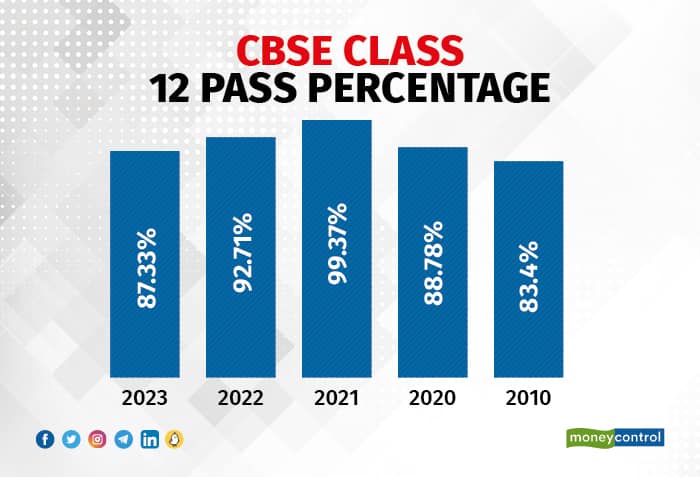



Education experts have dismissed claims by the Central Board of Secondary Education that the Class 12 pass percentage this year was an improvement over the performance in 2019, before the pandemic.
The CBSE Class 12 pass percentage dropped to 87.33 percent from 92.7 percent in 2022, according to the results announced on May 12. The CBSE said the result “betters the pass percentage of 83.40 percent of 2019 in the pre-Covid period.”
However, experts attributed the fall to gaps in learning and the loss of the “art and skill” of writing during the pandemic, among other factors.
The pandemic years of 2020 and 2021, when learning moved online, changed the dynamics of education in the country. Not only were students forced to adapt, teachers were also compelled to innovate.
Even though the country took the challenge head-on, it had several fallouts, which are becoming apparent now, said Nindiya Saket, the principal of Manav Rachna School in Noida.
“We as a nation weren’t ready for the scourge and the damage that could be done to us. Drawing parallels between the results of 2019 and 2023 is a criminal waste of time,” she said.
The understanding of various subjects could not be extended befittingly, thereby creating a learning gap, which was responsible for the current results, Saket said. She added that online platforms distracted students as they were handed out smartphones and laptops in the name of studies.

“The prerequisite to any assessment or examination is the art and skill of writing, which ceased to exist post the pandemic,” she said.
The pandemic brought a paradigm shift in how teaching was imparted and formal examinations were conducted. This was the first time since 2019 that Class 12 exams were held in person. The batch that just appeared for the Class 12 exams took the previous four exams online.
“During the pandemic, formal written work took a backstage and the impact can be seen in the latest results,” said Divjot Kaur, principal of Manav Rachna International School, Charmwood, in Faridabad. “Students appeared for exams online without any invigilation and simplified syllabus. They were not used to writing for three hours at a stretch. The current batch passed all their major- senior classes online.”
Syllabus, marking revampPrincipals of schools pointed out that a revamped syllabus and easier grading norms could be the reason for the rise in pass percentages during the pandemic years.
“In 2019-20, the syllabus was reduced and the marking scheme was compromised, due to which the results recorded a glaring jump, which was not justified. Major weightage was also given to objective-type questions. The ultimate impact has been seen now, with the ripple effect of the previous four years,” Kaur said.
The pass percentage had risen from 83.4 percent in 2019 to 88.78 percent in 2020. It jumped to 99.37 percent in 2021, a significant increase from the 2020 level.
According to Anju Wal, principal of Shiv Nadar School in Faridabad, the context and situations between the pre-pandemic and the post-pandemic years changed radically.
“Children were learning in isolation during the pandemic. Reviving the social interactions and looking after the emotional and social well-being of the child took priority in schools this year. The behaviour for learning was rebuilt. The format of traditional assessment with a full syllabus was another factor that might have resulted in a percentage drop,” she added.
Experts have argued that the impact of changes on education during the pandemic cannot be negated. According to them, the future of learning looks at an amalgamation of learning through traditional means and tools of technology.
The pass percentage for the Indian School Certificate (ISC) Class 12 exams conducted by the Council for the Indian School Certificate Examinations, a private national board, fell to 96.93 percent this year from 99 percent in 2022. The pass percentage was little changed from 96.52 percent in 2019.
Discover the latest Business News, Sensex, and Nifty updates. Obtain Personal Finance insights, tax queries, and expert opinions on Moneycontrol or download the Moneycontrol App to stay updated!
Find the best of Al News in one place, specially curated for you every weekend.
Stay on top of the latest tech trends and biggest startup news.